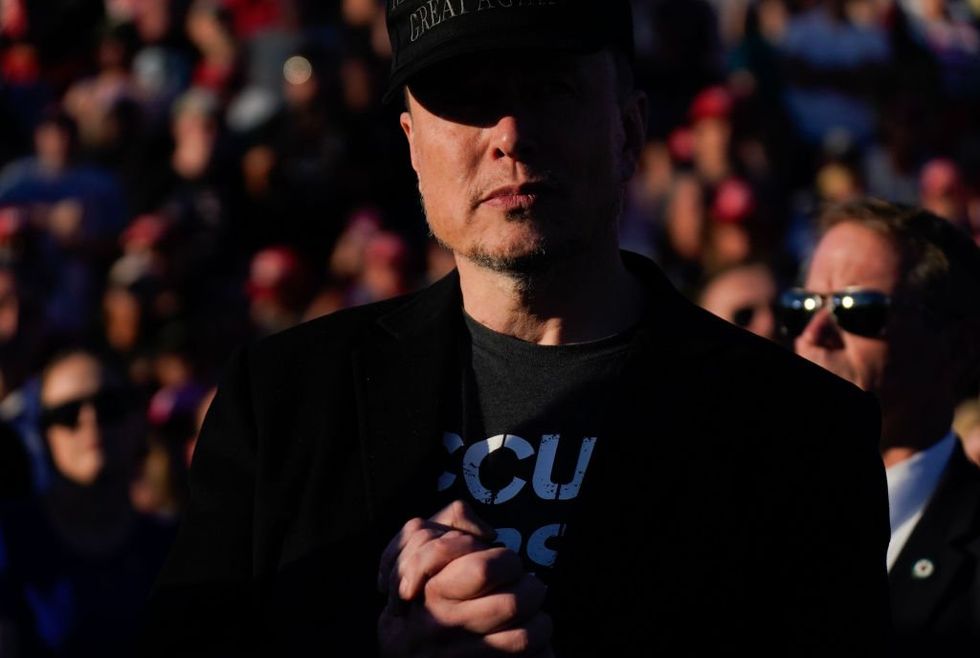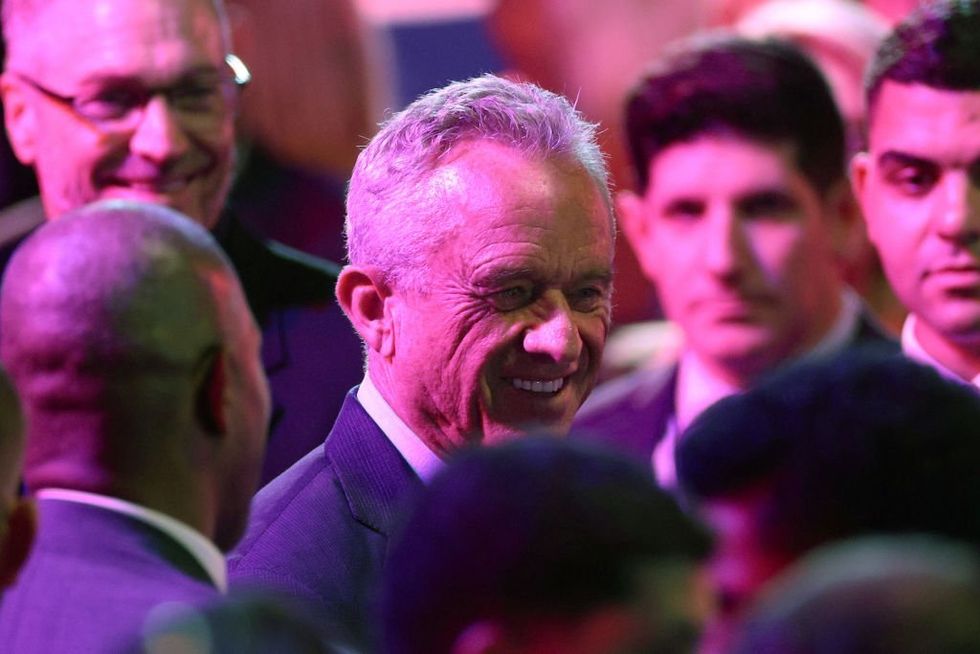Dark MAGA strikes back
Thirty-one days before winning the presidency Tuesday, Donald Trump looked out at the field of chanting people in Butler, Pennsylvania. Three months earlier, he had stood at that same spot and nearly lost his life in an assassination attempt. The crowd gathered in hushed reverence, hanging on his words as he described the moment with an almost prophetic tone. Dark MAGA is often labeled as sinister. Rather, it’s an ironic acceptance of the villain label: 'If the bad guys are claiming to be good, I guess we have to pretend to be bad.' "For 16 harrowing seconds during the gunfire, time stopped as this vicious monster unleashed pure evil from his sniper's perch, not so far away. But by the hand of providence and the grace of God, that villain did not succeed in his goal." Trump’s words struck a chord that night, underscoring resilience, faith, and a belief in something beyond mere politics. This wasn’t just a rally; it was one more victory for a movement that confounds the establishment. Dark MAGA is emerging as the peculiar future of American politics, carrying a strange, dark energy that both intrigues and unsettles. I’ve been to Trump rallies for the past nine years, and there is no experience quite like it. These events are part carnival, part cultural revolt, part wild yet neighborly party. In Butler, there was silence and “Ave Maria.” The occasion held a sacred power, like an ordained victory. The New York Times mocked it. In that moment, the MAGA hat wasn’t just a symbol; it was an invocation, a shared ritual. And here was Elon Musk. Rocket man, robot builder, Twitter king, Cybertruck mastermind, campaigning for Donald Trump. But in true Musk fashion, he sprinted out in the black MAGA hat, presumably his own invention. In this historic moment, his official coming-out as a Trump guy, he said, “I’m Dark MAGA.” Dark MAGA fashion While Dark MAGA has carved out its own look, the establishment scrambles to manufacture a relatable image, touting camo hats and forced smiles and ghoulish laughs. They hate shovels and apartments. Their inauthenticity is obvious, reptilian. They are the establishment. This shape-shifting is a tactic, a mechanism of control. To them, Dark MAGA is a nuisance, a hindrance. They unleash their media goons more often, more openly. A Washington Post fashion critic told NPR that the white supremacists co-opted the MAGA hat and it began “to represent a lot of really dark forces.” In 2019, when the entire media bullied Nick Sandmann, CNN described MAGA hats as “a potent symbol of racism.” The Los Angeles Times went with MAGA hats “share a certain unfortunate DNA” with blackface. In 2020, the New York Times suggested that MAGA hats might soon become relics of a “lost cause,” representing a “threat” that could return, a movement lurking just beneath the surface. In 2021, researchers determined that “in addition to racial resentment … white nationalism increased willingness to wear a MAGA hat.” Evil cursive Yet for Dark MAGA, the MAGA hat isn’t a threat to be contained but a symbol of defiance. It’s a challenge to the establishment, an unapologetic refusal to blend in, like Musk’s bold choice of an all-black MAGA hat with Gothic cursive at a Madison Square Garden. Multiple news outlets offered this playful choice of font as “proof” that the rally was in fact a Nazi uprising. Hunter S. Thompson would be ashamed at the way Rolling Stone called the Madison Square Garden rally "a hate-filled takeover," disguised in plain sight. Yet Dark MAGA leans into the mischaracterizations. Its symbols aren’t sinister; they are a tongue-in-cheek response to the establishment’s hysteria. The elite press calls Dark MAGAns “dark forces,” and they wear it as a title. But even Joe Biden can't resist the MAGA hat allure. Dark Brandon Meme culture thrives in anonymity, beyond the reach of mainstream narratives, and Dark MAGA’s shadowy memes are no different. Yet the left-leaning establishment cheered on memes like “Dark Brandon,” depicting a “dark” Joe Biden in a positive light. Dark MAGA is often labeled as sinister. Rather, it’s an ironic acceptance of the villain label: “If the bad guys are claiming to be good, I guess we have to pretend to be bad.” The political philosophy underpinning Dark MAGA aligns with Nick Land’s “Dark Enlightenment,” a critique of democratic systems that pits power retention against meaningful action. Land, an enigmatic philosopher, argues that democracy’s structural stagnation drives its leaders to make shortsighted choices to keep themselves in power. Dark MAGA, whether directly or indirectly, channels this ethos. Dark MAGA is tired of a political machine that rewards complacency, of an elite that speaks of “good intentions” while silencing dissent. If the establishment claims the moral high ground, Dark MAGA is happy to be the contrarian force shaking things up. The Dark MAGA rebellion Dark MAGA has tapped into a deep-seated frustration, a


Thirty-one days before winning the presidency Tuesday, Donald Trump looked out at the field of chanting people in Butler, Pennsylvania. Three months earlier, he had stood at that same spot and nearly lost his life in an assassination attempt.
The crowd gathered in hushed reverence, hanging on his words as he described the moment with an almost prophetic tone.
Dark MAGA is often labeled as sinister. Rather, it’s an ironic acceptance of the villain label: 'If the bad guys are claiming to be good, I guess we have to pretend to be bad.'
"For 16 harrowing seconds during the gunfire, time stopped as this vicious monster unleashed pure evil from his sniper's perch, not so far away. But by the hand of providence and the grace of God, that villain did not succeed in his goal."
Trump’s words struck a chord that night, underscoring resilience, faith, and a belief in something beyond mere politics. This wasn’t just a rally; it was one more victory for a movement that confounds the establishment.
Dark MAGA is emerging as the peculiar future of American politics, carrying a strange, dark energy that both intrigues and unsettles.
I’ve been to Trump rallies for the past nine years, and there is no experience quite like it. These events are part carnival, part cultural revolt, part wild yet neighborly party.
In Butler, there was silence and “Ave Maria.” The occasion held a sacred power, like an ordained victory.
The New York Times mocked it.
In that moment, the MAGA hat wasn’t just a symbol; it was an invocation, a shared ritual. And here was Elon Musk. Rocket man, robot builder, Twitter king, Cybertruck mastermind, campaigning for Donald Trump.
But in true Musk fashion, he sprinted out in the black MAGA hat, presumably his own invention. In this historic moment, his official coming-out as a Trump guy, he said, “I’m Dark MAGA.”
Dark MAGA fashion
While Dark MAGA has carved out its own look, the establishment scrambles to manufacture a relatable image, touting camo hats and forced smiles and ghoulish laughs. They hate shovels and apartments. Their inauthenticity is obvious, reptilian. They are the establishment. This shape-shifting is a tactic, a mechanism of control.
To them, Dark MAGA is a nuisance, a hindrance. They unleash their media goons more often, more openly.
A Washington Post fashion critic told NPR that the white supremacists co-opted the MAGA hat and it began “to represent a lot of really dark forces.”
In 2019, when the entire media bullied Nick Sandmann, CNN described MAGA hats as “a potent symbol of racism.” The Los Angeles Times went with MAGA hats “share a certain unfortunate DNA” with blackface. In 2020, the New York Times suggested that MAGA hats might soon become relics of a “lost cause,” representing a “threat” that could return, a movement lurking just beneath the surface.
In 2021, researchers determined that “in addition to racial resentment … white nationalism increased willingness to wear a MAGA hat.”
Evil cursive
Yet for Dark MAGA, the MAGA hat isn’t a threat to be contained but a symbol of defiance. It’s a challenge to the establishment, an unapologetic refusal to blend in, like Musk’s bold choice of an all-black MAGA hat with Gothic cursive at a Madison Square Garden.
Multiple news outlets offered this playful choice of font as “proof” that the rally was in fact a Nazi uprising. Hunter S. Thompson would be ashamed at the way Rolling Stone called the Madison Square Garden rally "a hate-filled takeover," disguised in plain sight.
Yet Dark MAGA leans into the mischaracterizations. Its symbols aren’t sinister; they are a tongue-in-cheek response to the establishment’s hysteria. The elite press calls Dark MAGAns “dark forces,” and they wear it as a title.
But even Joe Biden can't resist the MAGA hat allure.
Dark Brandon
Meme culture thrives in anonymity, beyond the reach of mainstream narratives, and Dark MAGA’s shadowy memes are no different. Yet the left-leaning establishment cheered on memes like “Dark Brandon,” depicting a “dark” Joe Biden in a positive light.
Dark MAGA is often labeled as sinister. Rather, it’s an ironic acceptance of the villain label: “If the bad guys are claiming to be good, I guess we have to pretend to be bad.”
The political philosophy underpinning Dark MAGA aligns with Nick Land’s “Dark Enlightenment,” a critique of democratic systems that pits power retention against meaningful action.
Land, an enigmatic philosopher, argues that democracy’s structural stagnation drives its leaders to make shortsighted choices to keep themselves in power.
Dark MAGA, whether directly or indirectly, channels this ethos. Dark MAGA is tired of a political machine that rewards complacency, of an elite that speaks of “good intentions” while silencing dissent. If the establishment claims the moral high ground, Dark MAGA is happy to be the contrarian force shaking things up.
The Dark MAGA rebellion
Dark MAGA has tapped into a deep-seated frustration, a feeling of disillusionment with politics as usual. It speaks for the “people” — the lowercase “p” people whom the establishment ignores.
Dark MAGAns argue that real change won’t come from reforms made to appease voters. It’ll come from breaking the machine itself, minimizing the influence of entrenched bureaucracies that cling to power.
Dark MAGA’s cynicism is rooted in the belief that meaningful progress has to begin with a clean slate, free from the elite’s self-preserving grasp. As Land critiques academia’s failure to understand capitalism’s unstoppable drive, Dark MAGA critiques a political class oblivious to the needs of the people.
The armor of God
Dark MAGA doesn’t see itself simply as a political insurgency. Its struggle goes beyond party lines; it’s a spiritual battle, a war against what MAGAns see as a darkness that threatens the soul of the nation. This isn’t merely about policies or power; it’s a deeper, more primal fight against forces they believe are actively working to dismantle truth and goodness. In their eyes, their opponents aren’t just political adversaries but “principalities and powers,” as the apostle Paul described, rulers of darkness that go beyond ideology (Ephesians 6:12).
For Dark MAGA, righteous politics is inseparable from Christianity. Without faith as a foundation, society will drift toward chaos. The Bible warns of angels cast into “chains of darkness” (2 Peter 2:4, Jude 1:6), a reminder to Dark MAGA that the stakes are cosmic.
The world is teetering on the edge of disorder, held steady only by the cross. In Thessalonians, Paul calls believers “children of the light.” Dark MAGA sees itself as that light, ready to endure even as the world seems to spiral into darkness.
Dark MAGA has proven that the “light of the body” (Luke 11:33) can only shine when the eye is fixed on truth, love, and goodness.
Luke Reichwalker
Dark MAGA doesn’t fear the darkness — it thrives in it, carrying a light of its own that MAGAns believe will outlast the decaying structures around them. For them, this isn’t about a temporary political gain. It’s a battle for the soul of the nation, a fight against the world’s spiritual malaise. In that darkness, they carry the light, refusing to let it fade.
Back when Trump first won the presidency in 2016, I was on a college campus, where hard-left activism dominated. Some classmates, reveling in their self-assigned roles as the “rebel force,” asked each person whether: “Rebel force or dark side?” My Trump-supporting friend and I exchanged a look and answered with a smirk: “If you’re rebels, that makes us the dark side.”
Originally Published at Daily Wire, World Net Daily, or The Blaze
What's Your Reaction?

































































































